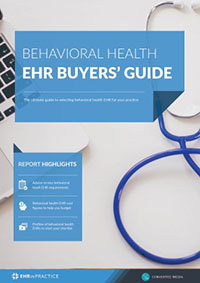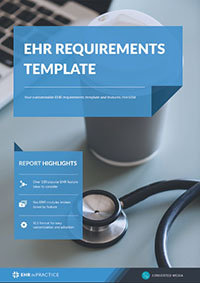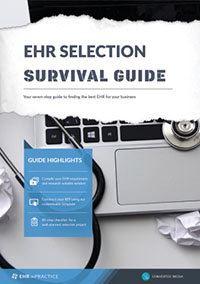Critical requirements for a psychiatry EHR
The demand for mental health services has become a critical area of need in the American health care system with 56% of Americans seeking or wanting to seek mental health services. However, many of the individuals in need of mental health services face barriers in accessing a mental healthcare provider. For example, in 2018 a survey conducted by the National Council on Behavioral Health conducted a study, which surveyed the population about mental health, found that 56 percent of patients want to access a mental healthcare provider, but face barriers to receiving these services.
Psychiatry practices play a vital role in meeting the population’s mental health care needs, as illustrated by data on mental health care in the population. This segment of the population presents complex issues in how to properly address their medical needs. These needs are generally defined by a patient population that are more prone to cooccurring conditions when compared to their peers and often require preventative care to mitigate risk from chronic health conditions such as diabetes and heart disease. As a result of these conditions, a psychiatry practice’s patient population will require unique services that can be effectively coordinated and monitored by providers. An effective psychiatry EHR can better equip a psychiatry practice to meet their need, given selection teams are able to match these requirements with the right product.
Finding the critical requirements for a psychiatry EHR
A practice’s EHR needs will generally be dictated by the needs of its patient population and the type of clinical data the treatment of these patients generates. Psychiatry practices, just as general practices, will require the core functionality offered by general practice EHRs.
Compare psychiatric EHR software with our free specialist behavioral health EHR comparison tool
However, the unique needs presented by a psychiatry practice’s patient population require a psychiatry EHR to offer sophisticated features about the sharing of patient data in a seamless fashion, monitoring care and medications, and providing patient engagement features.
Although one could assemble a lengthy list of EHR requirements psychiatry practices need, the three most critical requirements are discussed below.
1. Interoperability
Psychiatry practices overwhelmingly serve patients who are receiving care from other providers. Thus, the ability to share clinical information seamlessly is vital. Treatment data from a psychiatry practice should be able to be shared easily with other providers to coordinate care across different settings. Similarly, a psychiatry EHR should also be able to process information from other providers.
2. Medication management and monitoring
Mental illness is often comorbid with other physical illnesses. Accordingly, psychiatric practices should select an EHR that can monitor a patient’s health through sharing data with other providers, but also be able to monitor the medications patients are taking and be alerted if the risk of harmful drug interaction is present.
Further, many providers of psychiatric services deal with patients that are currently or have in the past dealt with substance abuse issues. Therefore, the practice is able to monitor potential warning signs of drug abuse found in the type of medications a patient is being prescribed by other providers.
3. Patient engagement tools
For psychiatry practices, patient engagement provides not only a way for clinicians to remain in close contact with their patients, but also offers the patient the ability to take an active role in their treatment by communicating with their provider. Through a patient portal that can provide an effective messaging system, a psychiatric practice can ensure that patients and clinicians can remain in contact. Further, a patient portal with scheduling capabilities can offer patients the opportunity to schedule appointments online, therefore, reducing no-shows. Lastly, an EHR that allows a free flow of information between patient and provider communication can facilitate greater compliance with treatment, particularly with medication adherence.
4. Telemedicine/telepsychiatry
In addition to communication and scheduling features, a psychiatric EHR should also offer telemedicine functionality. According to recent data, the United States is suffering from a dramatic shortage of psychiatrists and other mental health providers. The shortage is particularly acute in rural areas and inner-city areas. One of the strategies used to overcome this shortage is the use of telepsychiatry whereby a clinician either engages a patient directly via a remote link up or advises primary care providers who are on site engaging directly with the patient.
The American Psychiatric Association notes that the use of video-based telepsychiatry not only addresses the problem of provider shortages it also serves as an effective clinical tool in that it offers a “convenient, affordable and readily-accessible mental health services,” that leads to improved outcomes and higher patient satisfaction ratings. Given the benefits of telepsychiatry, it is important that selection teams select an EHR product that provides not only video-based telemedicine capabilities but also does it offer a platform whereby remote care can be delivered effectively and also comply with relevant regulations. One of the primary considerations in this regard involves whether the video interface provides an experience similar to face to face contact between patient and provider and whether the telemedicine features integrate smoothly with the EHR platform.
5. Regulatory compliance
Psychiatry practices will face a number of regulatory compliance considerations beyond the basic requirements found in HIPAA concerning the privacy of personal health information. Psychiatry practices who e-prescribe medications or deliver care through telepsychiatry must deploy an EHR that will be able to carry out these functions in a manner that complies with the layers of regulations that cover these facets of psychiatric health care services.
Although at their core, general practice and psychiatry EHRs share similar features, the unique considerations that come with the patient population in a psychiatry practice require a more specialized set of features that can help clinicians better provide care to what can often be a challenging patient population. When addressing what are the critical requirements for a psychiatry EHR it is important to consider how the needs of their patient population guide the requirements gathering process and thus define what are the critical requirements for psychiatry software. In summary, a psychiatry practice should consider not only core features and functionality, but also how this EHR can better serve its patient population.
Free white paper

Behavioral health EHR buyers' guide
A concise guide to behavioral health EHR features, pricing and vendors

Featured white papers
-

EHR Requirements Template
Over 100 requirement and feature ideas to kickstart your EHR selection project
Download -

EHR Selection Survival Guide
The comprehensive guide to selecting the best EHR system for your medical practice.
Download -

Behavioral health EHR buyers' guide
A concise guide to behavioral health EHR features, pricing and vendors
Download
Related articles
-

How to select an EHR vendor
A list of factors you should consider when choosing an EHR system
-

Why having a specialized behavioral health EHR is essential for mental health organizations
The reasons why a specialized behavioral health EHR is the best choice for mental health practices
-

Five essential EHR features for behavioral & mental health practices
Learn about the importance of clinical data handling to behavioral and mental health providers

